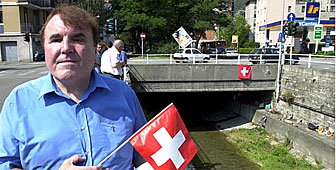Cornelius Koch: “sewer people” at the Ticino border

Cornelius Koch is known as a "father to the desperate" - the thousands of refugees who mass every year at Como/Chiasso on the Ticino border with Italy, attempting to find refuge and work in northern Europe.
Koch was born in 1940 to a family of Swiss economic migrants living in Romania. His father was a weaver from canton Thurgau who had been forced to seek work abroad.
“Let me take the example of Alban, a 16-year-old boy from Albania, who was obliged to leave Switzerland last year.’Sulzer, Loki, Erb-Garage, Rieter, Töss: I remember the names of all the bus-stops from Winterthur railway station to Töss. I lived there for six months. I liked it there,’ said Alban. Now he is an apprentice blacksmith in Italy, in the Como-Ponte Chiasso area near the border with Switzerland.
He still says the word “macchiiina” with the awkward pronunciation of an Albanian learning Italian. He has a good command of German. But now Como is his second home not Winterthur.
An organisation well supported by Swiss and Italian volunteers has given Alban -and 70 other under-age refugees expelled from Switzerland – the opportunity to learn a trade. The result: less juvenile crime in Como, and a deeply felt love of Italy.
My phone rings. An urgent call to make a trip across the border to Italy. The Red Cross at Tavernola informs me that the Italian police have detained an Afghan family of seven, turned back at the Swiss border. The police are taking their particulars: fingerprints, photographs, documents.
I go through the customs post and pass by the Ponte-Chiasso church building. It was here, two years ago, that Father Renzo Beretta was killed by a desperate refugee.
As I drive along, the thought goes through my mind: “How can it be that the death of this humble country priest moved half of Europe? Five thousand people attended his funeral in Como cathedral, including an Italian government minister and four cardinals. His death touched our conscience.”
Over the past 30 years, 10,000 refugees had found sanctuary in his parish. The bell tower of the church was converted for use as a dormitory. For refugees from all over the world, his was the first door that opened to them.
Como is like the eye of a needle for people from the south seeking refuge in the wealthy north. Now they are beginning to arrive from Afghanistan.
Finally, I meet “my” Afghan family: the parents and five children standing behind them. In their faces, I see the signs of desperation – the long journey, the Swiss border closed to them, then the Italian police.
I offer them all the money I have on me: 120,000 lire. They refuse, as people often do in such circumstances; they are not beggars, after all. I insist: “per I bambini, für die Kinder, for the children”. The youngest one smiles when I give him a tiny little bell taken from my keyring.
The sad little caravan moves off somewhere; the sound of the bell dies away.
At the Red Cross centre in Tavernola no one has any further news of them. Maybe they have ended up in the sewers of Como, where hundreds of people like them sleep each night, expelled wherever they go – “sewer people”, as they are referred to in these parts.”
Cornelius Koch

In compliance with the JTI standards
More: SWI swissinfo.ch certified by the Journalism Trust Initiative
You can find an overview of ongoing debates with our journalists here . Please join us!
If you want to start a conversation about a topic raised in this article or want to report factual errors, email us at english@swissinfo.ch.